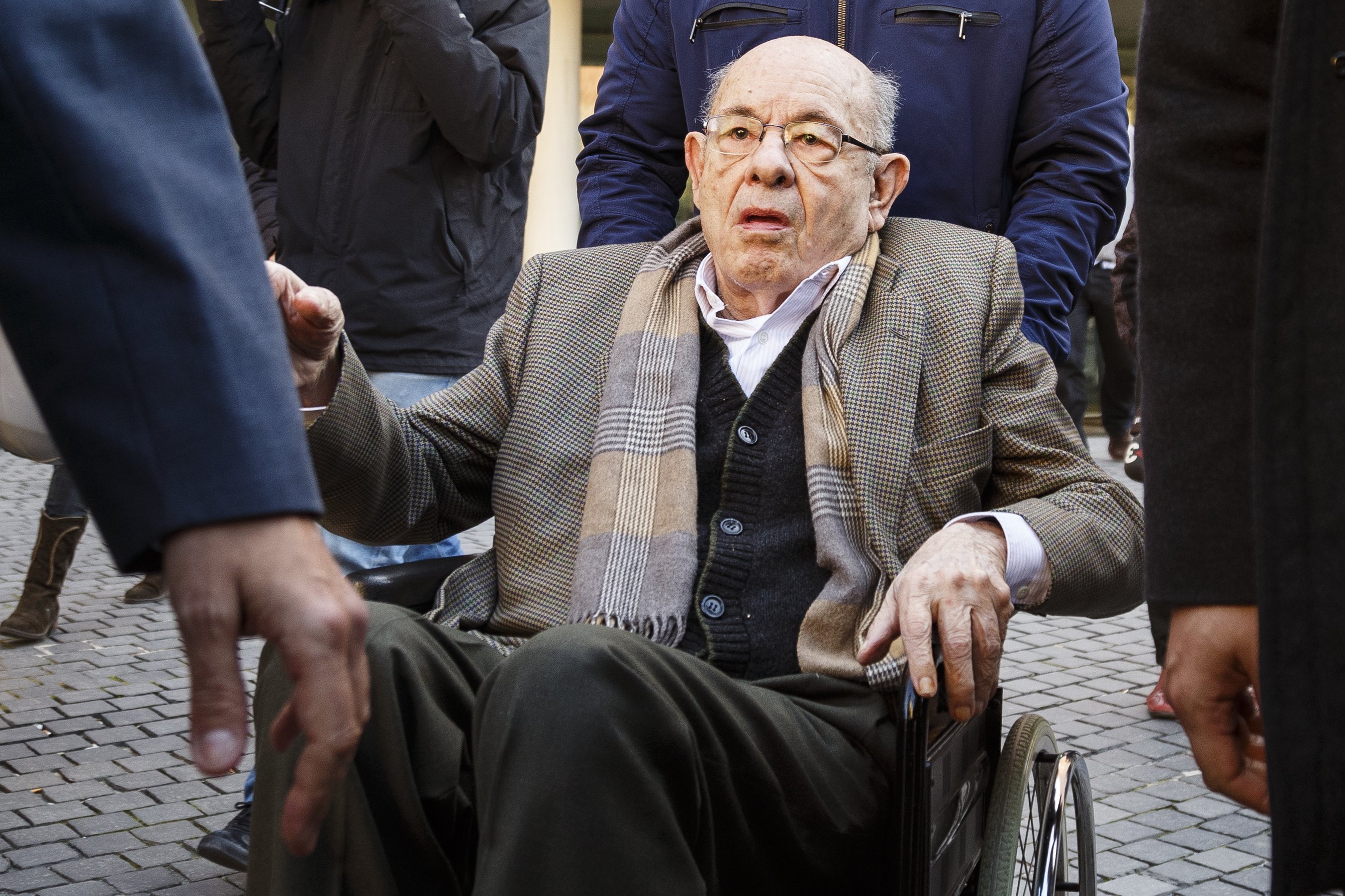Fèlix Millet is now in prison. Eleven years after the explosion of the enormous fraud case centred on Barcelona's Palau de la Música, one of the symbolic cradles of modern Catalan nationalism. And two more years after the final sentence under which he was ordered to serve 9 years and 8 months in prison. Now, at the age of 85, the man who was institutional president of the celebrated modernista concert palace, will begin serving his sentence. He confessed to fraud of 3.3 million euros, but the investigation raised the figure to 35 million euros. And even larger than the quantity were the political implications, because Convergència (Catalan Democratic Convergence, CDC), the centre-right party which had governed Catalonia for 23 years under Jordi Pujol, was a major beneficiary of the corruption.
Millet entered the prison of Brians 2 at 6.45pm this evening in an ambulance. Due to Covid-19, the former president of the Palau was to have his temperature checked first, and then his identity verified, and then the standard search and confiscation of possessions for inmates entering the jail. Fèlix Millet will be admitted to the infirmary module for the time being, and will then be interviewed to determine what his prison regime will be. This process could last up to 5 days. Millet will be isolated for a total of 15 days as required for coronavirus quarantine.
The board considering Fèlix Millet's prison regime will classify him as first, second or third level - high, normal or light security. And the prison surveillance judge has two months to decide this. In the event that a light security regime is applied to him, Millet will only have to spend night in the prison - or in a health centre, if required by his condition.
A year ago, Millet told ElNacional.cat in an interview: "It's totally unfair what they've done to me." By telephone, Fèlix Millet recounted all the things he had done for the Barcelona architectural wonder which he managed: "Do you know all that I did for the Palau? I made it twice as big, I created the restaurant, the new dressing rooms, the pool, the meeting space... I doubled the floor area, I removed the church next door after negotiating an agreement, I reached an agreement with the Catholic church... It was declared a UNESCO World Heritage Centre, which at first they didn't agree to, but I made an arrangement with Mateu Zaragoza and with the city council, with mayor Pasqual Maragall, so that we could improve the surroundings."
It was July 23rd, 2009, the height of summer, with a huge wildfire burning near Horta de Sant Joan. It was also another era: a left-wing pro-Catalan tripartite under the Catalan Socialists was in power in Catalonia and the PSOE's José Luis Rodríguez Zapatero governed in Spain. The Catalan Autonomy Statute, the starting point of the independence process, was yet to be cut to pieces by Spanish MPs. Corruption cases, although appearing in Spain, had either not yet emerged in Catalonia or had been covered up thus far. The Catalan oasis still seemed real. Then the Palau case broke out.
The Mossos d'Esquadra entered the Palau de la Música in the morning. It was an assault on the palace in every respect. A blow to the institution, through the looting of its coffers. A blow to the foundations of the Catalan bourgeoisie. A blow to Catalan society and culture. The blow to the Catalan oasis was irreversible. And the media impact, enormous.
The sentence, which came eight years later, confirmed the fraud and convicted those who led it: Millet and Jordi Montull, were sentenced respectively to 9 years 8 months and 7 years 6 months in prison. In addition, a fine for Millet of 4,120,540 euros for money laundering and tax fraud. For Montull, a fine of 2,998,284 euros. In addition, Millet and Montull were ordered to return the money that remained to the Palau de la Música consortium, the Orfeó Català choral association and the charitable foundation: a total of 23 million euros. They also have to pay 677,904 euros to the tax department. And Convèrgencia was ordered to repay all the profits it obtained from the looting, which were assessed at 6,676,105 euros. The party's ex-treasurer Daniel Osàcar was sentenced to 4 years and 5 months in prison and a fine of 3,796,555 euros. Osacar also enters prison today. Jordi Montull did so on Monday 22nd June.
Fèlix Millet confirmed during the trial that the enormous Ferrovial company - in the news again lately, in connection with Covid-19 public contracts granted to a subsidiary - was making donations to Convergència in exchange for public works. "I didn't say it in my confession, but it was true. Ferrovial gave me the money and I passed it on to CDC. I don't know the detail of the works. The works they carried out was a matter between CDC and Ferrovial," Millet himself confessed at his trial.
Said Millet, in a trial that was televised live: "The amount to be paid was agreed betwen Ferrovial and Convergència. The commissions were 4%: 2.5% for CDC, 1% for me and 0.5% for Montull".
The Palau de la Música case was one of the key factors which led to the dissolution of CDC in 2016.

